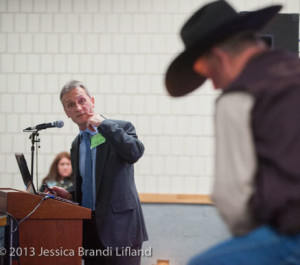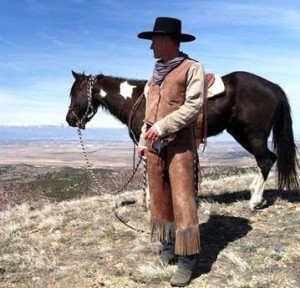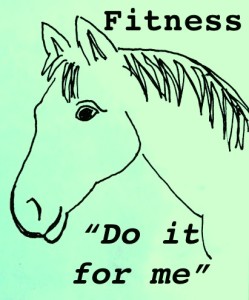BestHorsePractices is dedicating a entire section to Rider Fitness.
Russ & Marsha Jones, accomplished riders from Wolverine, Michigan
Stay tuned for upcoming features from:
Beth Austin, renowned physical therapist
Christina Savitsky, founder of Buckaroo Balance
Editor’s Note: Dr. Steve Peters is uniquely qualified to comment on the importance of lifelong fitness for riders and their horses. As a neuropsychologist for Intermountain Healthcare in Utah, he knows brain health has everything to do with physical health and well-being. He sees patients every day whose fitness (or lack thereof) has a direct correlation to their brain activity.
As a rider (and co-author with Martin Black of Evidence-Based Horsemanship), he’s readily conscious of how his weight and fitness impacts his equine partners.
Steve Peters, 5’11’’, 170 pounds
As a doctor, I witness the impact of America’s obesity epidemic first hand and every day. I specialize in brain functioning  in older adults. So, I see scores of middle aged and elderly patients who have adopted a more sedentary lifestyle, given up physical hobbies, and become unable to participate in activities.
in older adults. So, I see scores of middle aged and elderly patients who have adopted a more sedentary lifestyle, given up physical hobbies, and become unable to participate in activities.
Undesirable and harmful cognitive changes are directly related to this kind of decline. There are now plenty of studies showing associated brain shrinkage for individuals carrying excessive abdominal fat. Exercise and the adoption of some form of the Mediterranean diet are essential to healthy blood perfusion to the brain, studies show.
The horse must carry the burden of a rider’s weight and we know that when the saddle and rider exceed 20% of the horse’s weight, we are creating excess stress and degeneration of the horse’s joints. In

Discussion on Evidence Based Horsemanship with Dr. Stephen Peters, left and Martin Black.
Scenes from the 29th annual National Cowboy Poetry Gathering in Elko, Nevada. February 1, 2013. (Photo by Jessica Brandi Lifland)
regards to balance and body awareness, by being fit and trim we help our horses carry us without having to overcompensate with changes in their own biomechanics. In other words, at our normal Body Mass Index and assuming we have an appropriately sized horse, we can maximize communication with our horses.
I have known clinicians who have told me, “I probably could have stayed out of that wreck. But over the years I’ve become overweight and I could not get my body to react like it once did. I could feel my horse trying to get with me. Things happened too quickly and I couldn’t adjust.”
Thankfully, I also know clinicians who have changed their diets and added physical workouts in order to maintain their skills and help their horses.
Personally, I would like to enjoy a good deal of the rest of my life horseback. I know that the cognitive effects of brain shrinkage due to factors noted above will result in slower cognitive processing speed and attentional deficits. When I take horses out, I want my brain processing at the fastest rate possible and with as few attentional glitches as possible. I want to feel that my horse and I are moving together and that I am staying out of the horse’s way. I don’t want my horse to have to overcompensate for any extra weight or reduced stability on my part. I certainly don’t want to produce physical deterioration that will damage them over time.
 I hope this series of articles will encourage readers to think about what they want for their horses and their own health and to take steps necessary to make changes if needed. You can go to every clinic, buy the best gear, and read all the books. None of that will have as significant an impact on your equine partnership as a fit and healthy lifestyle.
I hope this series of articles will encourage readers to think about what they want for their horses and their own health and to take steps necessary to make changes if needed. You can go to every clinic, buy the best gear, and read all the books. None of that will have as significant an impact on your equine partnership as a fit and healthy lifestyle.
